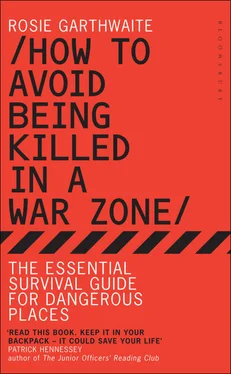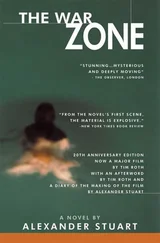Develop friendships within work and outside. Find people you can talk to. Before an event talk about what you are expecting to see and feel. You can learn from others’ experience or teach people who don’t have any. After an event tell people if there were any surprises. How did everyone cope? If something went wrong, why did it go wrong? There is a reason the military put such an emphasis on preparation and debriefing. Dealing with events in the present is a lot more effective than when clarity has faded a little. Learning how to talk and make decisions under stress is vital to being able to do your job in a disaster area or war zone.
Hoda Abdel-Hamid says: ‘When I know it’s going to be a bad day in the news I call my family early and tell them I am fine. Then I call immediately after the bad news and I tell my mum and husband I am OK. It’s very difficult talking to your loved ones because you are in such different realities. You have to play the game, put on an act.’
There is one exception to this, pointed out by Laura Tyson, who has spent most of the last 10 years working with children recovering from one disaster or another: ‘Children who have been through extreme situations just want to get back to being children again. Take some pencils and small notebooks, yoyos or bouncy balls to give out. If you’re a journalist, don’t push them to describe their experiences, even through play. You could have a negative impact on their recovery.’
Know when you are stressed and find a way to deal with it
This is about awareness. How do you respond to stress? Do you go quiet or become manic? Look at your sleep pattern – it’s usually a good indicator. Getting less sleep than you need means you are less able to cope with stress. It’s a vicious cycle.
Learn what triggers your stress and what you need to change in your life to cope with it. Maybe it means giving up that quick glass of wine before bedtime rather than taking it up with you. Maybe it means putting on the radio so you can hear a calm voice above the rest of the noise outside. Maybe it means keeping some music with you that you know will calm you down if you have a long time to wait.
Listen to your body when it says slow down
Journalist Giles Trendle says it took him a long time to recognize when he was under stress and to admit what was behind it. Now, more than 20 years after he first went to a war zone, his advice is to pick your battles, really understand that you are not invincible and know what that means.
‘After two years on the front line as a journalist in the Lebanon war, I went home to London, going via Cyprus to visit a friend. There I sat on my first safe beach in two years and realized that the whole left side of my body was paralysed. It felt tight, like it might be a heart attack, but I sort of knew it was driven by my recent experience.
‘I stayed in bed for a week in Cyprus and went straight to a doctor when I got to the UK. All my physical tests were clear. The doctor said it was post-traumatic stress disorder. It took me another three years and another huge emotional breakdown to really understand what that meant and how to deal with it.
‘The reverse culture shock of moving back home to London was what did it. I spent the first eight months huddled in a corner of my room. Sometimes crying and sometimes in a foetal position, I felt like a waste of space. I felt that no one else understood what was really happening in the world. And if they did understand, they didn’t care. People around me were angry about the new government budget adding another penny on the price of a pint. Where I had just come from people were worried about bombs and dying.
‘Then, on a weekend away in Dublin, it all stopped. I realized that everything was going to be OK. I accepted my mortality. I understood that the risks I had been taking were putting me in unnecessary danger for no reward. When shells started dropping on Beirut most people would seek shelter, but I would go out looking for a story – or something. I would come back with nothing but adrenalin. Somehow fate kept me alive when I should have been dead. But to anyone thinking of doing something similar, as some test of their manhood, I would say don’t – it’s not worth it. Whatever you are chasing is not worth it.’
Breathe
Breathing properly is good for your heart and good for your head. By ‘properly’ I mean taking long, deep breaths from your belly, not your chest. This technique is described more fully in Chapter 10, but you can also read about yoga and Pilates breathing online. Pick the one that works for you.
Imagination
There’s no doubt that imagination can play tricks on you when you’re under pressure, especially at night when fear has no distraction. But imagination can also be a powerful tool in helping to relieve stress. Imagine a ‘safe place’ – a room filled with your closest family, a bed somewhere else, a favourite garden or beach, a boat, a cloud – and go there in your mind when you are stressed or unable to sleep.
Your mind computes its experiences via dreams when you are in your deepest slumber. So nightmares can be expected and are a healthy way of filing away experiences. But entering sleep through the window of your safe place could help to ward off those bad dreams and help you get to sleep.
Hoda Abdel-Hamid makes a good point that the less you see, the less nastiness your mind has to deal with:
‘In Sarajevo in 1993 I had been seeing constant misery. I had to travel down the famous “sniper avenue” to work. It was well named – a road where you took your chances against gunmen who did not hesitate to target the press or civilians. It created a feeling of excitement. Then, when the excitement was over, I was immediately bored. I didn’t feel very good. I found everyone around me boring and trivial. I looked around for a solution that didn’t involve talking to anyone. I stayed in bed for a month, staring at the ceiling. I cut off all contact. In those days there were no mobiles, so it was easy.
‘Over time I have learnt to protect myself. There is no need for you to see everything first hand. There is only so much your head can take.’
Your imagination can work against you as well as for you when under stress. I know mine can. I am the queen of sleep-talking and sleep-walking when the pressure is on.
One cold November in southern England I was the officer in command during an exercise at Sandhurst army training college. We were all prepared for an attack by the Gurkhas, who were pretending to be the enemy. The troop had been on the go for three days in the field, so I made sure that ‘stag’ (the watch) was strictly assigned so that everyone could get a few hours’ sleep. But at four in the morning there was panic. I shouted for everyone to ‘Wake up’ and ‘Stand by for enemy fire’. Everyone rushed out of their sleeping bags, tied their boots and prepared for a blank-fire battle. Then a friend tapped me on the shoulder – I was in my sleeping bag, eyes firmly closed, crawling around in the mud like a soggy slug, holding my rifle and barking instructions into the dark. My team was not happy the next morning.
I have never understood why the army teaches you to sleep with your rifle in your sleeping bag. Surely there are better bedfellows.
Alcohol and drugs
How much is too much for you normally? Have you upped your intake? It is very easy to turn to alcohol, nicotine or drugs as an apparent solution to stress or to help you ‘wind down’ before you go to sleep. But be aware what you are doing to your body. You are actually making it more difficult for your mind and your system to deal with stress. Feeling numb is not good when you need your wits about you. The hallucinogenic properties of marijuana and other drugs mean that your brain is not able to deal with its experiences. It needs rest – clear-minded rest – to file those experiences away. So know your limits.
Читать дальше




![Джонатан Димблби - Barbarossa - How Hitler Lost the War [calibre]](/books/385421/dzhonatan-dimblbi-barbarossa-how-hitler-lost-the-w-thumb.webp)







